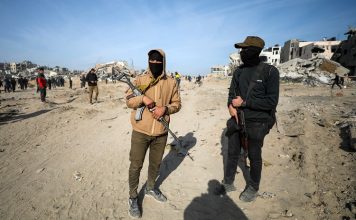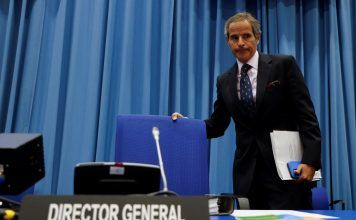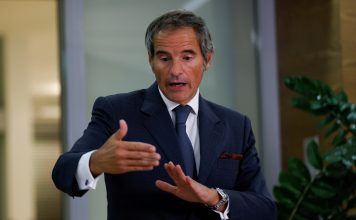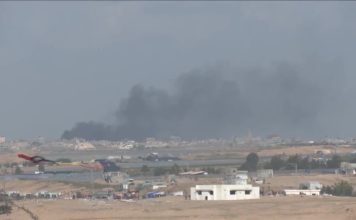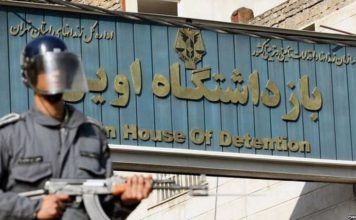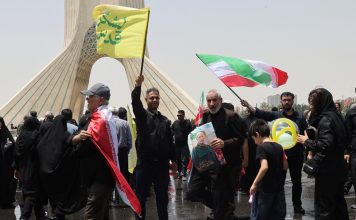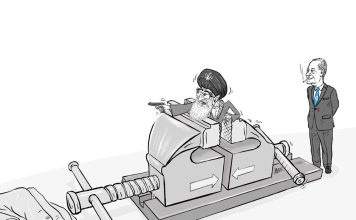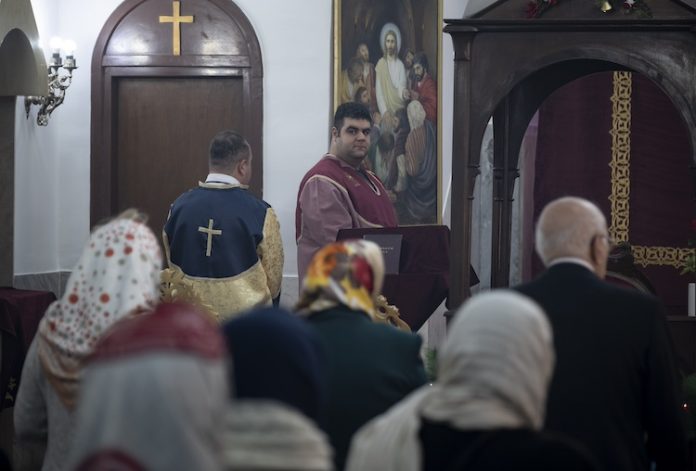
The number of Christians arrested in Iran for practicing their faith increased from 134 in 2022 to 162 in 2023, according to a new report published by Article 18, a London-based nonprofit that promotes freedom of religion in the country.
The Article 18 annual report, published on Feb. 19, was produced with UK-based Christian organizations Middle East Concern (MEC), Christian Solidarity Worldwide (CSW) and Open Doors. Its publication coincides with the anniversary of the killing of Reverend Arastoo Sayyah, the first Christian murdered for their faith in Iran following the inception of the Islamic Republic.
[aesop_image img=”https://kayhanlife.com/wp-content/uploads/2020/07/2009-04-24T120000Z_1080728459_GM1E54P00TF01_RTRMADP_3_IRAN-scaled.jpg” panorama=”off” align=”center” lightbox=”on” captionsrc=”custom” caption=”An Iranian Armenian woman prays during a mass prayer ceremony at a church in central Tehran. REUTERS./” captionposition=”left” revealfx=”off” overlay_revealfx=”off”]
There are approximately 800,000 Christians in Iran, of which 130,000 are ethnic Armenian and Assyrian Christians, and the remaining 670,000 converts from Islam. The Iranian government considers Christians who have converted from Islam to be apostates, a form of religious abandonment which is a criminal offense under Iran’s law. Punishments for this offense can be severe, with judges able to impose long prison sentences, corporal punishment and the death penalty.
Iranian Authorities Demolish Bahai Minority’s Houses, Human Rights Groups Say
Trends in the Islamic Republic’s treatment of Christians were described in the report. In a new development, there were “waves of arrests” of Christians in 2023. The waves began with “a handful of arrests reported prior to June, then over 100 within the next three months, before a further rash of arrests during Christmas,” according to the document.
Another apparently new tactic was aimed at bible distributors, with “over one-third of arrests targeting individuals in possession of multiple copies,” according to the report. The increased use of technology to monitor Christians was also reported.
“There’s a toxic combination where you have a threat of severe punishment, attempts to re-educate and manipulate people’s choice to choose a religion or not, and to combine this with widespread surveillance techniques used with minority groups who want nothing more than just bible study, prayer and to worship together,” said Borji Mansour, the Advocacy Director for Article 18, in an interview with Kayhan Life.
“We’ve got a minority that is given a limited level of freedom and we call them officially recognized Christians. They’re all limited by their ethnic language and the scriptures they use to worship. But from even this community, if there are people who somehow use the bridge language of Persian, that’s when they step out of the covenant recognition of a Christian. That’s why we have Armenians arrested and detained and imprisoned because of choosing the language of Farsi and mingling with converts as well,” Borji said.
The report called on Iran’s government to “immediately and unconditionally” release all Christians “detained on charges relating to their faith and religious activities” and to “clarify where Persian-speaking Christians may worship freely in their mother tongue, without fearing arrest and prosecution.”
The 40-page report also offered several case studies of Christian converts targeted by the Islamic Republic for their faith. One case study included details about the arrest and detention of Church leader Farhad Sabokrooh and his Christian wife Shahnaz Jizan.
In an interview with Kayhan Life, Sabokrooh and Jizan recounted their ordeals of being arrested in 2011, imprisoned and eventually exiled by the regime.
“We had notified the authorities beforehand, as we always did, that we would be having a gathering at Christmas, at our home in Ahvaz. The next thing we know our house is being raided by 40 or 50 security agents,” Jizan said. “They separated the children from the parents and put them in a corner of the house in another room. One of the officers guarding the children was wearing a mask and had a gun, imagine the kind of fear that they must have felt.”
Officials confiscated bibles and other items from Jizan and Sabokrooh’s home and arrested them without informing them of the charges. They were then taken to a detention centre and subjected to regular cross-examinations. Sabokrooh was interrogated for 20 days, while Jizan was interrogated for 10 days. They received a one year prison sentence each for charges including propaganda against the state, promoting Christianity, and encouraging conversion by non Christians and in particular Muslims.
Sabokrooh, who had been arrested on two separate occasions before 2011, attempted to appeal his sentence but was unsuccessful.
“The judge was infuriated by the defense that the lawyer had put forward. Our lawyer said he stood up from behind his desk and tried to attack her for having the audacity to defend us and said ‘what is giving you the right to defend such people? These activities lead Muslims astray or lead them to convert to other faiths,’” Sabokrooh said.
Sabokrooh and Jizan served their sentences in Ahvaz’s Sepidar prison. Shortly after their release officials pressured them to leave the country.
“We thought they were joking at first, but then we started to receive death threats. We were told by officials ‘It’s easy for us, you could have an accident with a motorbike or you could be run over by a car. But that’s not what we desire to happen to you, it is best for you to leave the country on your own,’” Sabokrooh said.
Fearing for their safety and unable to get a visa, the couple fled to Turkey and sought asylum through the United Nations High Commissioner for Refugees, the UN refugee agency. They were granted asylum after two and half years and moved to Washington in the US, in 2016. Sabokrooh’s family in Iran continue to receive threats from Iran officials.
Christians in Iran Are Arrested for Practicing Faith, Charity Says
Prince Reza Pahlavi Receives ‘Outspoken’ Award at Spirit of Lincoln Gala in California

